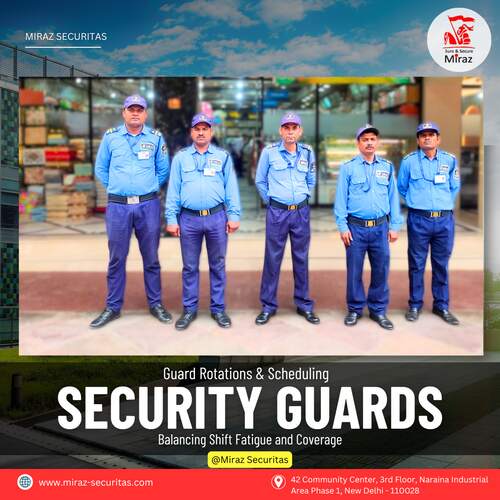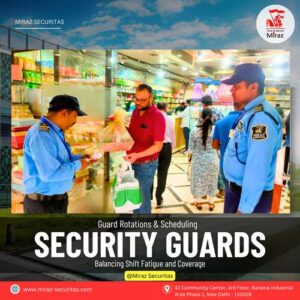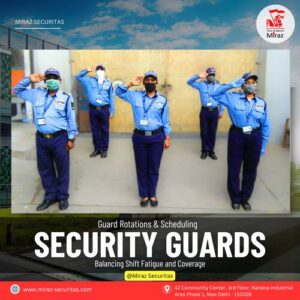Security guards are the backbone of any organization’s safety system. However, long and irregular working hours, especially during night shifts, can lead to fatigue and reduced alertness. A well-planned guard rotation and scheduling system not only ensures continuous protection but also supports the health and performance of the guards. Balancing adequate coverage with the need for rest is essential to maintain both security effectiveness and employee well-being shares Miraz Securitas the leading private security guard company in India for commercial and resident establishments.
What are the Challenge of Fatigue in Security Work?
Security work demands constant vigilance, physical presence, and quick decision-making. Guards often face long hours, monotony, and environmental stressors such as darkness, isolation, or extreme weather. Over time, this can cause mental fatigue, reduced concentration, and slower reaction times. Fatigued guards are more likely to miss potential threats or make errors in judgment.
Night shifts are particularly demanding because they disrupt the body’s natural circadian rhythm. Lack of sleep during the day and irregular eating patterns further worsen fatigue. If guard schedules are poorly managed—such as repeated night shifts without adequate breaks—the overall security quality declines, putting both personnel and property at risk.
What is the Importance of Balanced Rotations and Scheduling?
Effective scheduling is not only about filling time slots—it’s about ensuring each guard is mentally and physically fit during their shift. Balanced guard rotations help in:
-
Maintaining Alertness: Rotating shifts periodically prevents burnout and keeps guards attentive.
-
Equal Workload Distribution: Fair rotation avoids overburdening a few individuals with repeated night duties.
-
Improved Morale and Job Satisfaction: Guards who feel their health and rest are valued perform better and stay motivated.
-
Consistent Coverage: Proper scheduling ensures that no critical area or time period goes unmonitored.
Smart Scheduling Strategies
-
Use of Rotating Shifts:
Implement a rotating shift system (morning–evening–night) instead of fixed night duties. This allows guards to recover and adjust their sleep patterns periodically. -
Adequate Rest Periods:
Ensure a minimum of 8–10 hours of rest between shifts. Avoid scheduling double shifts or back-to-back night duties. -
Shorter Night Shifts:
If possible, make night shifts slightly shorter than daytime ones. Fatigue builds up faster at night due to lower energy and visibility. -
Pairing and Team Rotation:
Rotate pairs or teams together. This builds familiarity and teamwork, ensuring smooth handovers and mutual alertness during the night. -
Use of Scheduling Software:
Modern scheduling tools can help plan rotations, track working hours, and automatically balance workloads, reducing manual errors and favoritism. -
Health and Wellness Support:
Encourage guards to take short breaks, stay hydrated, and maintain healthy eating habits. Periodic medical check-ups can help monitor fatigue-related health risks. -
Supervisory Checks and Communication:
Supervisors should conduct surprise checks, maintain regular communication, and ensure guards are alert. A quick conversation or activity break can reduce drowsiness during slow hours.
Balancing guard fatigue with effective coverage is not just a scheduling issue—it’s a matter of safety, performance, and professionalism. Smart rotation systems, fair workload distribution, and attention to rest and wellness can significantly enhance vigilance and reliability. When guards are well-rested and motivated, they become sharper, more responsive, and better equipped to ensure round-the-clock protection for the organization.
- Why Licensed and Trained Bodyguards Matter More Than Ever - January 29, 2026
- Why Background Verification of School Security Guards Is Non-Negotiable - January 22, 2026
- Safe Living Alone After 60: What Families Must Prepare For - January 15, 2026


